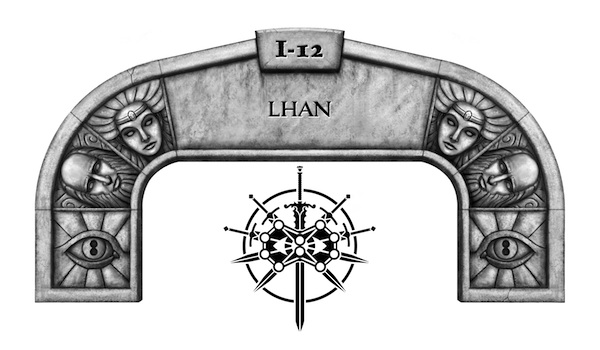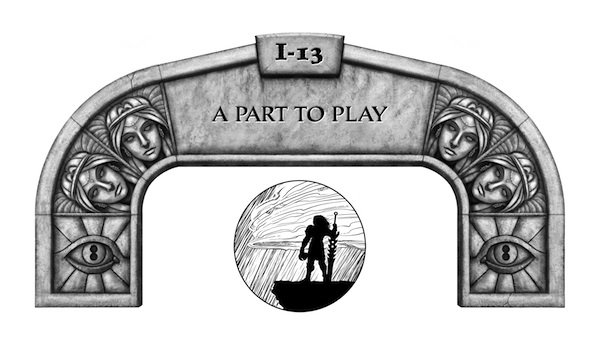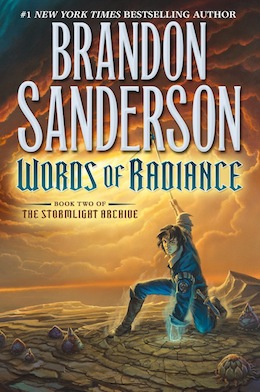Welcome back to the Words of Radiance Reread on Tor.com! Last week, we reviewed the letter comprising the epigraphs of Part Four, with one old friend urging another to stop interfering in things above his pay grade. This week, we examine Interludes 12 and 13, taking place in Kholinar and Narak respectively.
This reread will contain spoilers for The Way of Kings, Words of Radiance, and any other Cosmere book that becomes relevant to the discussion. The index for this reread can be found here, and more Stormlight Archive goodies are indexed here.
Click on through to join the discussion!

Interlude I-12: Lhan
Point of View: Lhan, an ardent
Setting: Kholinar
Symbology: Double Eye of the Almighty, Palah, Ishar
IN WHICH an ardent takes on a new protégé; she is less than amenable to the guidance he attempts to give her; the character and conduct of the queen are called into question; wasted food is contemplated; the character and conduct of the Alethi elite are called into question; the Almighty and the Heralds are called into question; a choice is made; the queen is condemned as all the ten fools; a protégé is executed; riots begin.
Quote of the Interlude
“Don’t you even wonder?” she asked, staring at those piles of refuse, rain pattering just beyond. “Don’t you stop to think about the cost of your gluttony?”
“Cost?” he asked. “I told you nobody starves because we—”
“I don’t mean the monetary cost,” she whispered. “I mean the spiritual cost. To you, to those around you. Everything’s wrong.”
“Oh, it’s not that bad,” he said, settling down.
“It is. Lhan, it’s bigger than the queen, and her wasteful feasts. It wasn’t much better before that, with King Gavilar’s hunts and the wars, princedom against princedom. The people hear of the glory of the battle on the Shattered Plains, of the riches there, but none of it ever materializes here.
“Does anyone among the Alethi elite care about the Almighty anymore? Sure, they curse by his name. Sure, they talk about the Heralds, burn glyphwards. But what do they do? Do they change their lives? Do they listen to the Arguments? Do they transform, recasting their souls into something greater, something better?”
“They have Callings,” Lhan said, fidgeting with his fingers. Digiting, then? “The devotaries help.”
She shook her head. “Why don’t we hear from Him, Lhan? The Heralds said we defeated the Voidbringers, that Aharietiam was the great victory for mankind. But shouldn’t He have sent them to speak with us, to counsel us? Why didn’t they come during the Hierocracy and denounce us? If what the Church had been doing was so evil, where was the word of the Almighty against it?”
Pai is, apparently, the only thoughtful person in Kholinar. She’s asking a lot of the right questions, but no one in the palace or the monastery wants questions. They just want to be comfortable luxurious, to enjoy their privileges without any more effort than necessary.
I’ll refrain from drawing real-world parallels…
Commentary
For such a short chapter, there are a lot of little things I can’t help noticing. The first one is Lhan’s suave contempt for his monarch.
“Queen Aesudan likes to feel that those around her are refined. It makes her feel refined by association.”
I can’t read that as anything other than an implication that the queen is not refined, whether it’s in her speech, or her tastes, or… what. But it reeks of condescension. Then there’s this bit:
“…The queen figures that if she treats her ardents well, it will buy her favor with the One who makes the storms, so to speak. Nice food. Nice robes. Fantastic quarters. Lots of free time to do whatever we want. We get these things as long as she thinks she’s on the right path.”
The cynicism behind this attitude drops my jaw—mostly because the opening paragraphs made me want to like Lhan, but this makes me want to flog him out of the monastery, and all the rest of the sycophants with him. (It reminds me of the quip, “When you ask yourself, ‘What would Jesus do?’ don’t forget that upending tables and chasing people with whips are real possibilities.”) These ardents are that kind of people: they take advantage of the queen’s bad behavior, uneasy conscience, and lame theology to make sure they have an easy, luxurious life. They certainly can’t be bothered to consider how their wastefulness might actually affect other people, nor how it must look to the people of the city. I’d say it’s hard to believe they think they can get away with it indefinitely, but you can look around IRL and see it happen.
What really blows my mind about it, though, is that Navani left Kholinar completely in Aesudan’s hands, with the claim that “the queen is sufficiently endowed with the requisite skills to hold Alethkar.” Did she really think Aesudan was doing a fine job? Did Navani not care about this kind of behavior? Pai certainly seems to indicate that it’s not a new thing, so Navani must have seen it. Did she simply lack the authority as the “dowager queen” to do anything about it? Or did she decide that what little she could do in Kholinar was insignificant compared to what was happening out on the Shattered Plains?
I don’t have any good answers for this. Perhaps, compared with an approaching Desolation, a greedy and debauched queen in Kholinar is insignificant—but the stability of the kingdom isn’t, and that’s what’s about to go up in flames. It will be very interesting to see what condition things are in by the time Our Heroes are able to check in on Kholinar. Between the riots and the Everstorm, I expect it will be a right mess.
One other unrelated comment: I don’t know that this is surprising, really, but it occurs to me that the people of Roshar don’t know that Honor has been Splintered. I mean, they probably don’t know about Adonalsium and Shards and all that anyway, but they did know about Honor and Cultivation to some extent. And they don’t know that he’s gone.
Stormwatch
This Interlude takes place sometime during the Weeping, but obviously before the arrival of the Everstorm. So, somewhere between Day 2 and Day 14 of the expedition; in terms of countdown, somewhere between 7 and -5. In fact, this could be happening at the same time as the Epilogue.
Ars Mechanica
There’s a lovely section describing the art, architecture, and geological features of the monastery, palace and city. Shallan’s lesson on cymatics with Kabsal comes irresistibly to mind, as he demonstrated for her the way Kholinar’s layout—including the windblades—were created by vibration. (Methinks this may also apply to the Shattered Plains, from a different angle… but I don’t think I want to explore the possible physics just now.)
Anyway, Brandon innocently opens this descriptive passage with the Circle of Memories, then proceeds to the city, and (after some conversation) to the palace’s grand eastern hall. It’s all nice and world-build-y, and that’s about it… until you remember it when you’ve finished the book.
They passed into the Circle of Memories, a round room with ten lamps on the walls, one for each of the ancient Epoch Kingdoms. An eleventh lamp represented the Tranquiline Halls, and a large ceremonial keyhole set into the wall represented the need for ardents to ignore borders, and look only at the hearts of men… or something like that. He wasn’t sure, honestly.
It’s the storming Kholinar OATHGATE!! All the nice details about the lamps, the ten kingdoms, the eleventh lamp, the keyhole… GAAAAHHHHHH!
On a quieter note, there are a couple of interesting connections to be made.
One, the Circle of Memories is part of the monastery—meaning that in all probability, the ardents live in facilities originally built for the local contingent of Knights Radiant. How ironic, that those who preach the betrayal of the Knights Radiant should live in their home and betray all that Vorinism originally stood for.
Two, Lhan identifies the eleventh lamp as representing the Tranquiline Halls, but we know it takes you to Urithiru. Is this merely misinterpretation, or is it forgotten history? I know we’ve speculated that the Tranquiline Halls might be Ashyn, and that for some reason humans had to leave that planet and so migrated to Roshar. It might even be that the Tranquiline Halls story has its origin in the Splintering of Adonalsium and the withdrawal of Honor and Cultivation (with some humans for seed??) from Yolen to Roshar. But… could it be that at some point, Urithiru itself was overthrown by the forces of Odium, who destroyed the Oathgate links, and shattered the Plains in an attempt to destroy the last access? Or that perhaps the Radiants had to flee Urithiru, and themselves locked the Oathgates and shattered the Plains in their attempt to destroy the last one behind themselves, locking the destroyers in Urithiru? Either of those could be a plausible origin for the story of the Tranquiline Halls that are inaccessible in the flesh, but must someday be recovered. Just sayin’…
I’m sure y’all will have plenty of darts to throw at that theory, but it really had to be said.
You Have to Break a Lot of Rockbuds
Food. There is lots of food in this chapter, most of it rotting. But why is it that the best-sounding food is always Herdazian?
Heraldic Symbolism
Palah, the Scholar, may be here to supervise Pai’s evaluation of the queen’s conduct and her careful explanations thereof. I like that idea, anyway. Ishar… well, Ishar the Priest could be here for the ardentia in general. Or he could be here mockingly, as what the ardentia are only pretending to be. Or he could be here for Pai’s concern for theological truth. Looks like he’s got lots of reasons to be here!

Interlude I-13: A Part to Play
Point of View: Eshonai
Setting: Narak
Symbology: Listener, Battar
IN WHICH a voice still screams; one sister has changed, and one has not; battle plans are discussed; Venli knows too much, and is hiding the source of her knowledge; Eshonai is discomforted, but moves on with her work.
Quote of the Interlude
“The Alethi will come,” Venli said, strolling at Eshonai’s side and absently bringing energy to her fingers and letting it play between two of them. Venli smiled often while wearing this new form. Otherwise, it didn’t seem to have changed her at all.
Eshonai knew that she herself had changed. But Venli… Venli acted the same.
Something felt wrong about that.
It’s a weird combination of heart-breaking and comforting to read the places where Eshonai’s instinct remembers what her mind can’t. Some part of her, when it’s not screaming in terror, seems able to recognize the inconsistencies in what she observes. I don’t know whether or not I should hold onto the hope that someday the old Eshonai will win out.
Commentary
Preparations.
Eshonai is sorting out her new stormforms, getting ready for the upcoming confrontation. We didn’t know it the first time through, of course, but the part the noobs have to play will be to sing. I suppose the odds are no worse for them than for the ones doing the fighting, but it still seems a bit cold, looking ahead. Those who are new to a fighting form will stand, sing, and get slaughtered without even attempting to fight back. Except that, of course, the singing will be their form of attack. So there’s that, I guess.
This Interlude is just sad and disturbing. And creepy. What is with Venli? The only options I can see are that she’s worn stormform before, but no one saw it; or that she’s been wearing a form of the old gods that no one else recognized as such (perhaps the outward appearance was exactly like nimbleform?); or that she’s been in direct contact with one of the old gods. I’m going with those as being in order of least to most likely. She just knows things she shouldn’t, and she’s way, way too comfortable with stormform.
That whole thing about how the new form hasn’t changed her at all? Yeah, that’s not eerie or anything. The only question is, how long has this—whatever it is—been going on? I can’t help thinking that it’s been years in the process.
Stormwatch
This chapter takes place on the same day as Chapter 75, when Kaladin & Shallan climbed out of the chasms to find Dalinar staging his army. This is, for what it’s worth, the last day before the Weeping begins.
Sprenspotting
No spren are actually mentioned, but there’s the scene where Venli is walking along, letting “energy” play between her fingers. Is that a spren, or is it just energy? Both? Something more? Bah. I have a feeling that most of my questions about the Listener “old gods” spren will not be answered. Maybe I’ll be wrong; it’s happened before.
Heraldic Symbolism
Only one Herald guards this chapter: Battar, the Counselor, wise & careful. Is this because Venli is acting as Counselor to Eshonai? Or is this one of those mockeries, where Battar is watching while Venli plays a deceitful and manipulative Counselor instead of a wise one?
There. Two very short Interludes with Implications this week; next week, we’ll dive into a very looooong Interlude, as we rejoin King Taravangian on his “mission of mercy” to Jah Keved.
Alice Arneson is a long-time Tor.com commenter and Sanderson beta-reader, and is eagerly looking forward to JordanCon next month with some of the good folks here.










